2013年考研《英语》考前押密试卷(一)
-
Your company is bringing up the consumer data up to date. Write a letter to your client to
1 ) ask him to fill in a form. and
2) emphasize the importance of this information.
You should write about 100 words on ANSWER SHEET 2. Do not sign your own name
at the end of the letter. Use "Li Ming" instead. You don' t have to write the address. ( 10 points )
-
Write an essay of 160- 200 words based on the following drawings. In your essay,
you should
1 ) describe the pictures,
2 ) interpret the meaning, and
3) comment on the issue.
You should write neatly on ANSWER SHEET 2. (20 points)
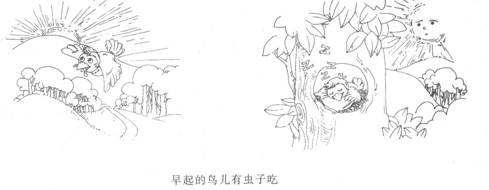
-
__________
-
__________{Page}
-
__________
-
__________
-
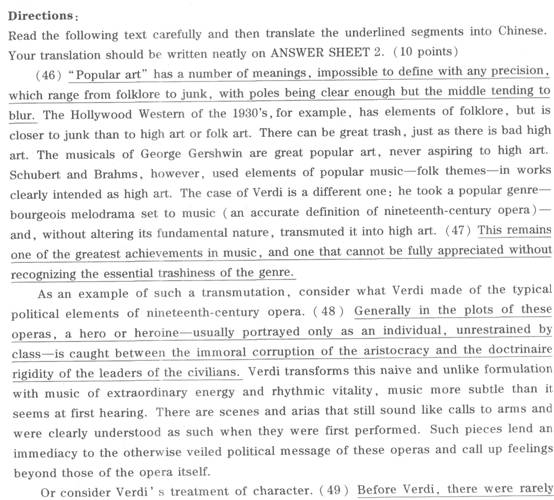
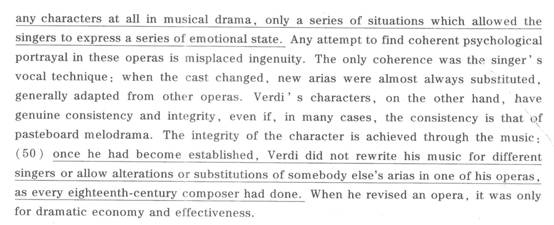
根据以上内容,回答1~5题。
__________
-
__________
-
__________
-
__________
-
__________
-

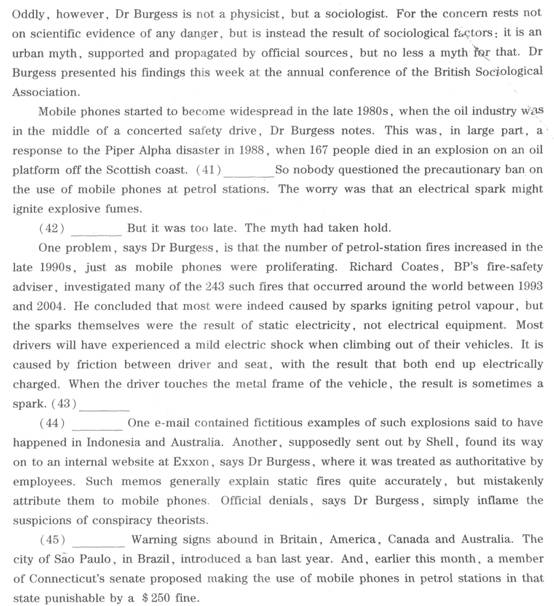
[A] The safety drive did not apply merely to offshore operations: employees at some British oil-company offices are now required to use handrails while walking up and down stairs, for example.
[ B] As a result, the company had to pay a huge amount of compensation to the families of the victims and law suits concerning those fires seemed to be endless.
[ C] A further complication was the rise of the internet, where hoax memos, many claiming to originate from oil companies, warned of the danger of using mobile phones in petrol stations.
[ D] This is particularly noticeable in Britain. The country that led the way in banning mobile phones at petrol stations is also the country that has taken the strongest line on the safety of mobile-phone use by children.
[E ] Despite the lack of evidence that mobile phones can cause explosions, bans remain inplace around the world, though the rules vary widely.
[ F] By the late 1990s, however, phone makers--having conducted their own research-realized that there was no danger of phones causing explosions since they could not generate the required sparks.
[ G ] This seems to have become more common as plastic car interiors, synthetic garments and rubber-soled shoes have proliferated.
根据以上内容,回答1~5题。
__________
-
It c
- an
- be inferred from the last paragraph that [ A] identity theft is even more serious in Europe than in Ameri
- ca. [ B ] American policymakers might learn from the laws in Europe. [ C ] American policymakers are more concerne
- d with individual interests. [ D ] the cost of identity theft is usually covered by companies in the US.
-
According to p
- aragraph 2, which of the following is true? [ A] ChoicePoint is an agency that is responsi
- ble for the information leakage. [ B ]
- ChoicePoint is an agency where Social Security numbers are kept. [ C ] Personal information is most unsafe with Bank of America. [
- D ] The loss of data tapes in Bank of America is a case of identity theft.
-
ChoicePoint reve
- aled the fraud
- be
- cause [ A] its top two bosses wante
- d to exercise stock options. [ B ] it was required by local legislation. [ C ] it was sued for failing to safeguard individual's data. [ D ] medical companies are also allowed to coll
-
The re
- al reason for ChoicePoint's fast expansion is that [ A] it collects and sells personal information. [
- B ] it has a
- cquire
- d nearly 60 firms since 1997. [ C ] the industry is largely unregulated by the government. [ D ] the information it provides is useful to many.
-
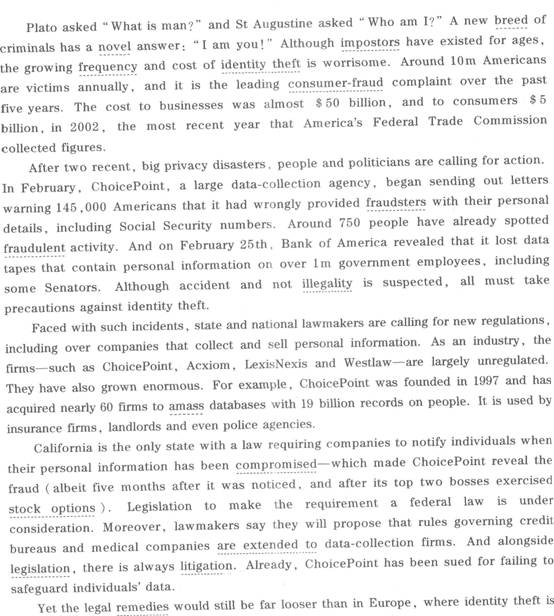

根据以上内容,回答16~20题。
Plato and St Augustine are mentioned in the text to
[ A] raise philosophical questions.
[ B] show an obvious contrast.
[ C ] introduce the criminals.
[ D ] pave the way for the main topic.
-
It c
- an
- be inferred from the last three senten
- ces that [A] those who have fought an
- d bullied cannot be considered civilized. [ B ] there is nothing wrong if civilized people do some fighting and bullying. [ C ] even civilized people have done some fighting and bullying. &
-
On
- all the highest pillars in the great cities of the world, we find [ A] the figure of the same conqueror or general or soldier. [
- B ] the figure of some
- conqueror or general or sol
- dier. [ C ] a figure reprsenting the number of conquerors, generals or soldiers in that country. [ D ] the figure of a person who helped civilization forward.
-
By s
- aying" From the point of view of evolution, human
- beings are very young
- chil
- drenindeed" ( paragraph 3 ) the author means [ A] very young children are not civilised. [ B ] evolution does not help civilization forward. [ C ] human beings are still at the begin
-
In the
- author's opinion, the countries that ruled over a large num
- ber of other
- countries are [A] certainly not the greatest in any way. [ B ] neither the greatest nor the most civilize
- d. [ C ] possibly the most civilized but not the greatest. [ D ] possibly the greatest in some sense but not the most civilized.
-
Wh
- at the people really ignore in the de
- bate is that [ A] the effe
- cts of the mo
- dern pollutants on the living organisms. [ B ] the present situation is remarkedly different from the past. [ C ] the stress of progress of science to the neglect of environmental protection. &nb
-
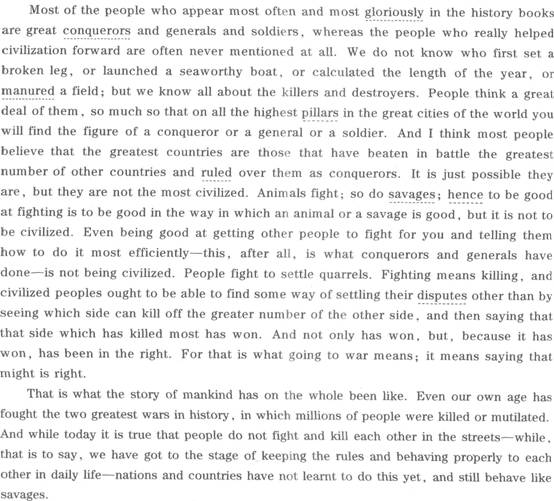
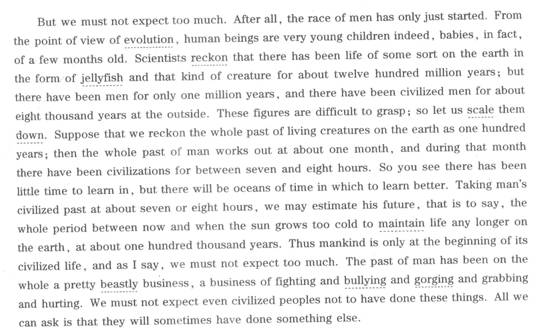
根据以上内容,回答11~15题。
The first sentence of the opening paragraph indicates that
[ A] most history books were written by conquerors, generals and soldiers.
[ B ] no one who really helped civilisation forward is mentioned in any history book.
[ C ] history books neglect the real heroes behind civilisation.
[ D ] conquerors, generals and soldiers should not be mentioned in history books.
-
The
- author would most pro
- bably agree that the origin of environmental pollution lies in [A] the indifferen
- ce to the con
- dition of the environment. [ B ] the lack of the ability to control the progress of science. [ C ] the inability of science to deal with certain human endeavors. [ D ] the ignorance o
-
As used in the second sentence of the first p
- aragraph, the phrase "in depth" means [ A ] fully and thoroughly.&n
- bsp; [ B ] distantly and remotely. [
- C ] seriously an
- d extent. [ D ] strongly and unpleasantly.
-
The text is m
- ainly a
- bout [A] the nature of s
- cientific progress. [ B] the relationship between the progress of science an
- d pollution. [ C ] certain factors that harm the circumstance. [ D] the awareness of our responsibility to environment.
-
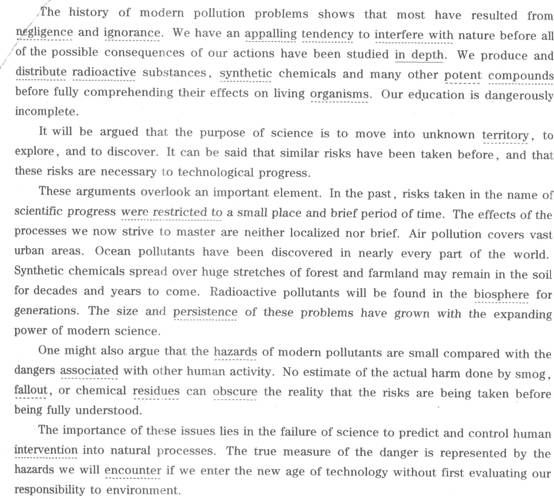
根据以上内容,回答6~10题。
Which of the following adjectives may best describe the tone of this text?
[ A] Unconcerned.
[ B ] Humorous.
[ C ] Serious.
[ D ] Exaggerated.
-
Which of the following is true
- according to the text? [ A] The 2006 incidence occurred
- be
- cause of the carelessness of a supervisor. [ B ] Yellow liqui
- ds in a glove box should always be handled with heed. [ C ] Highly enriched uranium can be diluted for civilian uses. [ D ] At least one worker has been seriously affected in the 2006 incidence.
-
The word "innocuous" ( p
- aragraph 4) is closest in meaning to [ A ] insensitive.&n
- bsp; [ B ]
- confi
- dential. [ C ] innocent. [ D ] harmful
-
NRC is criticized by Congress members chiefly bec
- ause [ A] law makers draw the conclusion that NRC has illegal documents. [
- B ] they think NR
- C is hi
- ding more information than it should be. [ C ] the public have the tights to know any potential hazards. [ D ] they think nuclear facilities are not a matter of national security.
-
It c
- an
- be inferred from the first three paragraphs that [ A] the publi
- c have access to Mr. Jaczko's memoran
- dum. [ B ] the agency never told Congress which factory was involved. [ C ] the Nuclear Fuel Services is a non-profitable government company. [ D ] documents marked "Official Use Only
-
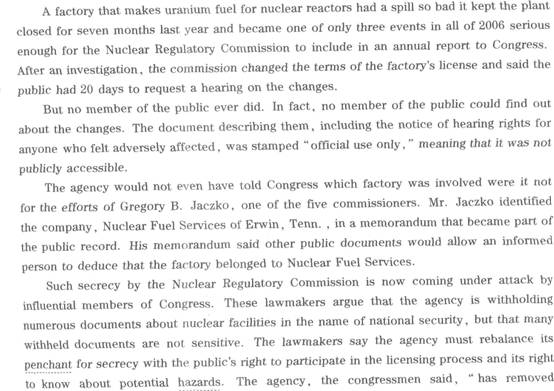
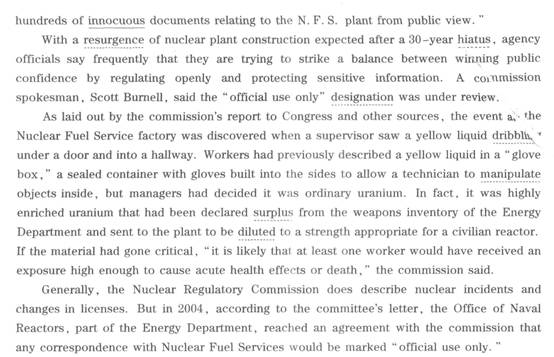
根据以上内容,回答1~5题。
Why did no member of the public request any hearing?
[ A] Because the general public often show no interest in such matters.
[ B ] Because the heating rights of the public are adversely affected.
[ C ] Because the public has stamped the documents "official use only".
[ D ] Because the public are not aware of the changes in the first place.
-
_________
[
- A] taking&n
- bsp; [B] grasping [
- C] sucking [
- D] catching
-
_________
[
- A] instead of&n
- bsp; [B] in spite of [
- C] in place of [
- D] by contrast of
-
_________
[
- A] offer&n
- bsp; [B] equip [
- C] help [
- D] provide
-
_________
[
- A] essential&n
- bsp; [B] important [
- C] possible [
- D] inevitable
-
_________
[
- A] in time&n
- bsp; [B] overtime [
- C] at times [
- D] behind time
-
_________
[
- A] floor&n
- bsp; [B] level [
- C] groun
- d [D] layer
-
_________
[
- A]in turn&n
- bsp; [B] in fa
- ct [C] in return [
- D] in the end
-
_________
[
- A] large&n
- bsp; [B] vast [
- C] great [
- D] big
-
_________
[
- A] green&n
- bsp; [B] land [
- C] wil
- d [D] grown
-
_________
[
- A] created&n
- bsp; [B] developed [
- C]
- designed [D] formulated
-
_________
[
- A]
- business [B]
- commercial [C] tra
- ding [D] exchanging
-
_________
[
- A] shows&n
- bsp; [B] denotes [
- C] in
- dicates [ D] hints
-
_________
[
- A] popular&n
- bsp; [B]
- common [C] or
- dinary [D] widespread
-
_________
[
- A] evidences&n
- bsp; [B] pi
- ctures [C] traces [
- D] tracks
-
_________
[
- A] getting
- by [B] getting on [
- C] getting through [
- D] getting over
-
_________
[
- A] others&n
- bsp; [B] the others [
- C] other [
- D] the other
-
_________
[
- A] only&n
- bsp; [B] almost [
- C] virtually [
- D] actually
-
_________
[
- A] realm&n
- bsp; [B] net [
- C] relation [
- D] web
-
_________
[
- A] for&n
- bsp; [B] with [
- C] to [
- D] without
-
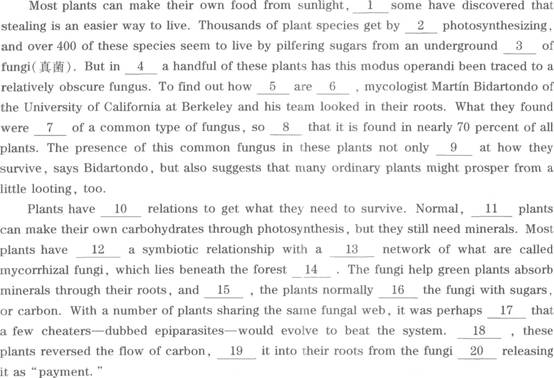
根据以上内容,回答1~20题。
_________
[A] but
[B] if
[C] because
[D] though












